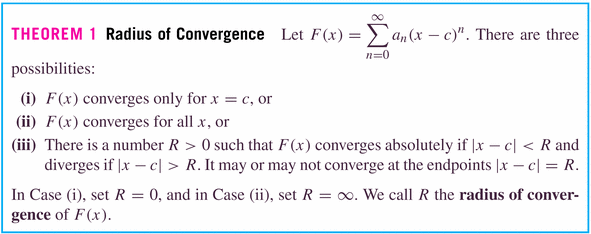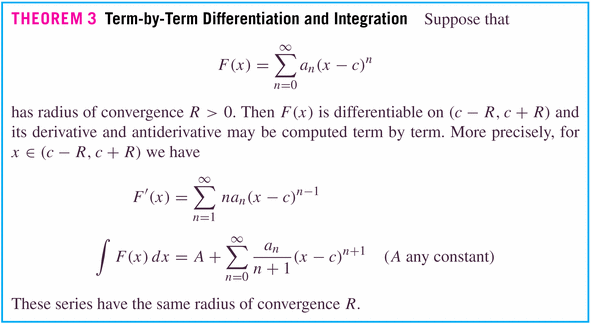- Dr. Krug is in charge today! He'll finish up the material for 11.6, and look at a few examples.
- Now, rather than simply infinite sums of numbers, we're going to
consider an infinite sum of functions in what are known as
power series. They're like polynomials, but they don't
have finite degree.
The terms will be monomials, constants times powers of x.
We've been sneaking up on these: we started by talking about Taylor series polynomials, which are generalizations of the linearization, or linear approximation (which has the tangent line as its graph).
Then we seemed to switch gears, and began talking about adding up infinite sequences of numbers.
Now we realize that, with functions for terms, each value of x specified gives rise to an infinite series, and we might immediately wonder if the series is convergent.
So what kind of function has an infinite number of terms? How do you evaluate such a thing? What kinds of function are these? It turns out that a lot of our old friends can be expressed this way --
, for example, as we've seen.
Now what did we assert about
? That
For what values of x would this converge?
Apply the ratio test for arbitrary x, and what do you discover?

So
presents us with a case where we have an "infinite radius of convergence".
Let's look at an example where our radius of convergence is not so nice: consider
If we construct the terms of the Taylor series polynomial as we did in section 9.4, via the equation
And then set a=0 (MacLaurin series), and note that all the derivatives evaluated at 0 are n!, then we see that
Now: for what value of x will this converge?


- Examples:
- What does Theorem 2 say will be the radius of
convergence of the series for
?
- What about the endpoints?
- #3, p. 585

- What does Theorem 2 say will be the radius of
convergence of the series for
- Examples:
- What do we get when we differentiate the series
for
term-by-term?
- What do you get when you integrate
? How can we find a power series for this function?
- We can use one series to find the power series
expansion for another series. What would be the power series
for
?
- #40, p. 586
- What do we get when we differentiate the series
for